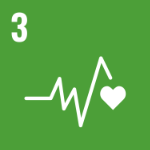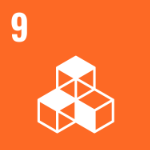

3. Good health and well-being

9. Industry, innovation and infrastructure
No to fake news, yes to scientific evidence
The increasing digitalization of contemporary society has brought with it the phenomenon of fake news. There is a lot of information circulating, but not everything that is being said is true. And this is a problem that permeates all the dimensions of our life. This phenomenon is, even more, worrying in all things related to health as it is often combined with a disregard for scientific evidence, as observed in anti-vaxx movements.
Through apps we can install on our smartphones, tablets, smartwatches, etc., we can better monitor our body and all its “engines” (heart, brain, etc.). Almost all smartphones come with an app that collects information about our physical activity. They can also bring installed apps that let you record information about eating habits, sleep patterns, etc. Smartwatches, or fitness devices such as Fitbit or Jawbone, may have sensors that measure heart rate, body temperature, sweat, and so on. The possibilities are immense. Whether in terms of devices we can use or in terms of what they can measure.
In many leisure situations, we are collecting information about our health or about habits that we know influence our health. There are thousands of apps that we can download and where to record and store a lot of information about us and our lifestyle (age, weight, height, physical activity, diet, sleep patterns, illness, moods, allergies, pain, menstrual cycle, fertility, medications we take, etc.).
And we make decisions about what to do with the results we see appear on the screen. The app itself can suggest these decisions: “get up and move” — it is a simple example. We all like to know that we are achieving our goal of walking 10,000 steps a day to stay “healthy.”
By the way, did you know that this goal of walking 10,000 steps a day was created for an advertising campaign by a Japanese pedometer manufacturer in the 1960s? That number was not based on any kind of research; it just sounded good! But it also does not hurt you to walk 10,000 steps day, do not worry.
But depending on the app, disease, organ or behavior being monitored, the suggestions may have more clinical content and, hopefully, be based on evidence gathered through rigorous scientific methods. However, there is no process for the scientific validation of any of the apps available for download. Many apps are not tested or validated and can even give advice contrary to best medical practice.
It is important to recognize the potential of technology in the contribution it can make to increasing health literacy. However, as with the news, one must look at the source of the content and say: no to fake news, yes to scientific evidence.

